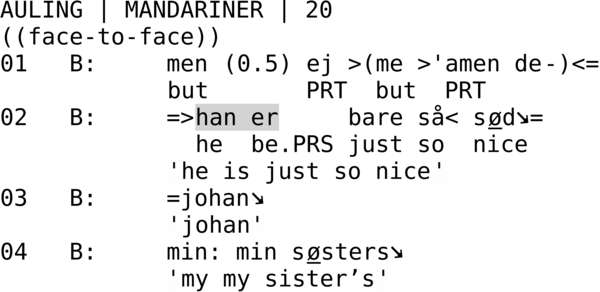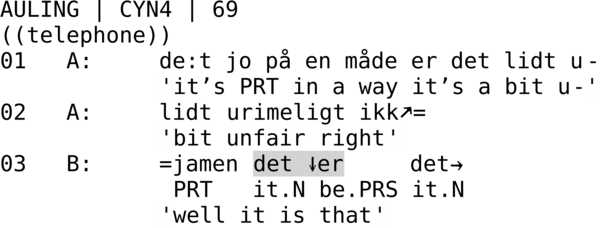Copula drop
Copula verbs are linking verbs which couple two or more elements together. For example, in ”The bear is big” the copula verb is links the subject the bear to the subject complement adjective big. In present tense utterances, copula verbs are semantically empty which means they don’t contain any information. In predicative clauses (sentences where the subject and the subject complement refer to the same entity) the copula verb is unnecessary. Therefore, speakers sometimes leave out the copula-verb er ’be’. There are two possible scenarios of this type: either the copula-verb is completely omitted – aka a copula drop – or the copula is embedded in the previous word, by lengthening of the last vowel of that word. Additionally, the copula verb can either be stressed or unstressed. Together, these four realizations form a continuum from ‘marked presence to ‘overt drop’. This continuum is illustrated below, together with examples and descriptions of the four realizations.
Omitted Incorporated Present Marked presence
< < < < < < > > > > > >
Overt drop Lengthening Unstressed copula Stressed copula
Overt drop
When the copula verb is omitted completely, it is called an overt drop. This is exemplified in the below example.

In line 1 we have a fully realized copula-verb, whereas in lines 2 and 6 there could have been a copula-verb after det ‘that’, but there isn’t. There is also no trace of a copula in the pronunciation of the adjacent words, where it could have occurred as an incorporated phonetic lengthening of the word. In line 2 the copula-dropped part of the utterance is constructed as a split sentence, which in Danish is a common way of emphasizing a specific sentence constituent. In this case, the sentence det jo ikk ligefrem kampe ‘it (copula drop) not exactly matches’, begins with det ‘it’, emphasizing the word kampe ‘matches’ in an assessing utterance. The copula drop in line 6 is also part of an assessing utterance.
Lengthening
Lengthening is when the copula verb is not pronounced as a separate word, but rather incorporated in the previous word which is lengthened. In the below example, the lengthening occurs in Maren’s introduction of herself, in the beginning of a phone conversation.
![AULING | HILSEN | 8 ((telephone)) 01 Joh: det johanne→ 'it’s Johanne' 02 (.) 03 Mar: ↑he:j johanne de:t ma[ren↘ ]= ↑hi johanne i:t.N maren 'hi Johanne it’s Maren' 04 ?: [(·hhh/hhh] 05 Joh: =h:ej ↑ma↓re:n↘= 'hi Maren'](/fileadmin/_processed_/1/4/csm_copula_drop_2_821d33828c.png)
In this example the copula verb has become part of the previous word det ‘it’, which is lengthened to d:et. There is thus no separate copula-verb connecting d:et and the speaker’s name. This is illustrated with a colon after the lengthened vowel. The fact that er ‘is’ doesn’t have its own spot in the sentence is not treated as a problem by Johanne, because she immediately responds to her introduction with a greeting in line 5.
Dropped copula and lengthened copula only exist in our data after personal pronouns and short adverbs ending in a vowel (det ‘it’, de ‘they’, je' ‘I’, du ‘you’, vi ‘we’, I ‘you PL’, så ‘so/then’, nu ‘now’).
Unstressed copula
As the name suggests, unstressed copula is when the copula verb is pronounced without stress. This variant of the copula is the one presented in traditional grammars of written language.

In the above example we find an unstressed copula verb right after han ‘he’. The only function of the copula verb here is to couple han ‘he’ and the following description bare så sød ‘just so nice’. The action performed in the copula clause is an assessment.
Stressed copula
Stressed copula is a present, separated, and distinct copula verb which is stressed and thus emphasized in relation to the remaining words in the utterance. In the below example we see a stressed copula verb in line 3. The stressed word is marked by underlining.

Here A and B are evaluating casework. Line 3 is an equating utterance of the type X = Y. The first det ‘it’ is equal to the second det. The first det refers to the subject being evaluated – the casework – and the second det refers to the adjective predicate from the previous utterance, urimeligt ‘unfair’. Stressed copula often has an interactional function. In the above example, the copula verb functions as a so-called modified repetition. B repeats A’s assessment of the fact that it is lidt urimeligt ‘a bit unfair’. However, B’s repetition has a modified form where urimeligt ’unfair’ is replaced by det ‘it’ and the copula verb is stressed. By using a modified repetition the speaker expresses agreement, while simultaneously claiming independent access to what is being evaluated.
Possible functions of the different copula forms
In the above examples, the copula verb is used in split sentences, in evaluating utterances, in introductions of self and in modified repetitions. Stressed copula is often found in these types of modified repetitions, but we still haven’t investigated the exact functions different expressions of copula have.
Sources and further reading
Hamann, Kragelund & Mikkelsen (2012) is a scientific article written by three DanTIN members, which reviews some preliminary results about copula drop.
Jensen (2012) is a scientific article reviewing different variants of the copula-verb but from a different viewpoint than the one taken here.
Kragelund (2015) is a writing about Grammar of Danish Talk In Interaction describing the continuum and analysing different occurrences of copula drop.
Stivers (2005) is a scientific article explaining the phenomenon which we here have called modified repetition.
Indgange
The Building Blocks of Talk-in-interaction > Word classes/Parts of speech > Verbs
Social Actions > Evaluating actions
Social Actions > Questions > Request for confirmation
